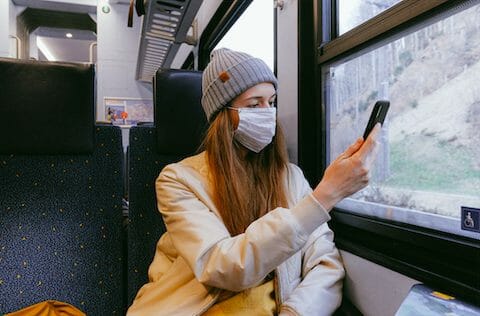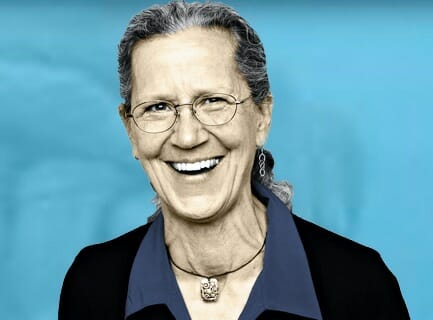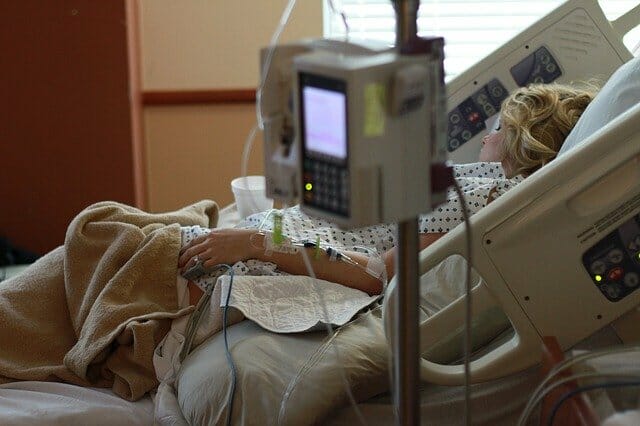As COVID-19 continues to spread, particularly hitting vulnerable populations like elderly in nursing homes, caregiving for a loved one with dementia may feel overwhelming. But creating a plan to manage themselves and their loved ones during the pandemic can help.
Being Patient spoke with Lori Nisson, Family and Community Services Director at Banner Alzheimer’s Institute, about the practical steps caregivers can take to keep themselves and their loved ones safe.
- It’s important to maintain a structure and routine in the life of a person with dementia to avoid stress.
- Caregivers should establish plans for their loved ones in the event that they contract COVID-19.
Creating Structure and Maintaining Routines
Being Patient: This is an extraordinary time, and we’ve talked with a lot of people about the isolation. Should everyone just be staying home?
Lori Nisson: I think it depends on your personal circumstances. So for caregivers who are taking care of somebody at home, that can be a big challenge in itself in that they may have been relying on outside help or an adult program, and now it’s just the two or three of us at home. So how do we really manage the day-to-day? It can be quite a challenge.
So I think even though we’re home it’s important to maintain a healthy routine. Even though it’s easy to want to stay in your pajamas and just kind of hang out on the couch, it’s really important for all of us and in particular the person with dementia to really remain in routine. So getting up every day, washing up, showering, whatever it is you do for your and your person. And then I think even in small spaces trying to create some separation of environment.
So if you can, leave the bed for sleeping, and then moving to the kitchen and sitting at a table to eat, and then maybe moving to another space like a desk to create some structure and activities. Other opportunities, particularly for a small space, would be to reduce clutter because too much clutter and stimulation can really stress somebody with dementia.
And then I think moving every day is really important. I don’t mean that you have to run a marathon, but depending on whether your person is capable, walking around the house, depending on restrictions in your community maybe walking outside in your garden or on the sidewalk. Even if you’re at home, maybe looking to YouTube for creating some stretching or chair exercises.
And when you get on each other’s nerves, which is common for any of us when we’re in a closed space all day and all night, just take a deep breath and allow your person to forget, because they probably will, and that’s the beauty of the short-term memory loss.
Being Patient: Why is routine so important for people with dementia? What is it about routine?
Lori Nisson: I think it’s about just having that structure and knowing, as much as they can remember, what to expect. We know that any change in routine, environment, or caregiver can be really stressful. So trying to keep things very consistent and routine is going to be really beneficial. The person and you will kind of get into a rhythm, which is really important.
Preparing for Worst Case Scenarios
Being Patient: The thought of a caregiver getting sick themselves is daunting. If the caregiver gets sick, I don’t know if most people even know how to deal with that.
Lori Nisson: I think you’re right. Caregiver wellness is critical just throughout the journey, but especially so with COVID-19. And so making sure that the caregiver is really taking care of themselves is critical. But I’d say a few things you could do to prepare would be making sure that things like advance directives, healthcare powers of attorney, and financial powers of attorney are in place, that’s really important.
If you’re the caregiver and you’re the power of attorney for your person, making sure that there’s a backup person as well is really helpful. And then I would say too that it’s a really good idea both now and at any time to always have a backup plan. So particularly with COVID-19, our opportunities for backup plans are more limited, but make sure that you have a family member or a close friend who can step in should you become ill, and don’t just think about it, ask the person and get a commitment.
And then depending on your community, before and after COVID-19 it’s always good to have researched a care facility that’s going to work out for your person, because if you end up in the hospital now or at any other time it’s always good to have a plan in place. Right now those opportunities are certainly more limited, but it would be good to check in your area of residential communities that are available if they have openings and if they’re accepting people in this crisis.
I can speak from my own perspective that my in-laws are in assisted-living right now, and people are not being let in and out. So you want to find out what options you have now, because planning ahead is always the best way to go instead of waiting for something to happen and then you’re in a much more compromised position.
Staying Calm and Connected
Being Patient: What would you recommend for caregivers and their loved ones to stay connected?
Lori Nisson: It’s really two-sided. So one, how do you stay connected to your loved one, who is vulnerable, if you don’t want to risk exposing yourself to them, and vice versa. I’d say keep up with phone calls, FaceTime. I also think that the art of the letter has been lost, and I think especially for somebody with dementia who can read, that reading a letter or a card can be very powerful. If they can’t read, ask caregivers to do that for them.
And then I think even setting up a rotation would be helpful. Maybe there are many family members who don’t call much or aren’t closely connected to this person, but how hard is it for them to send a letter or a card once a week? That way this person is at least getting material and information.
And then I think the second part is really, what do you do with all this free time? And you know, I’m saying structure your time, well how do you do that? And I’d say that there’s a lot of things you can do that are very simple. Things like, if you are cleaning home, and it’s important to be attending to cleanliness even more so right now, your person with memory loss could be helping you with folding clean towels, or wiping down counter-tops.
Then we could be doing some things together that could even relax both of us, things like listening to music, or taking some deep breaths. I have done relaxation groups for folks in the moderate and beyond stages of Alzheimer’s, and I’ve had many people who can still close their eyes, listen to their breath, take a deep breath in, and let it out slowly. That can be really healing for both people.
And then I think even simple things like looking through a picture book, an old photo album, pictures on an iPad could be really soothing if you’re sitting together during the day. Doing some adult coloring could be pretty useful for both people. And if you are able to be outside, even if it’s just on your property, getting outside every day is very critical.
Being Patient: Lori, thank you so much, all of this caregiving advice is so practical for managing fears.
Lori Nisson: Absolutely. You know I think we all get a lot of angst, anxiety, fear; these are very unknown circumstances. But I think as human beings and as caregivers, how we manage this situation is really important, right? So there’s a lot of ambiguity in life, but we don’t recognize it always. We know that there’s a lot of ambiguity with dementia, you don’t know what’s coming next, this is a disease where there’s lots of grief and losses.
And I think the pandemic is the same, right? We have a lot of unknowns and a lot of fear, and we don’t know exactly what’s coming in the future. One day we’re being told that it’s okay to walk around in a grocery store as long as you’re six or 12 feet away from somebody, but you don’t need a mask. And then you wake up in the morning and now we’re being told by the CDC that it is a good idea to wear a mask even if you’re not sick because you may be asymptomatic while carrying the virus.
It’s easy to get incredibly anxious, so I think what we all want to do is really quiet the mind. I think remaining calm and as present as we can is really critical during this moment, as it has been for you when you’ve coped and managed other crises.
These are really challenging times, and it’s really easy to be self-critical and to be angry and frustrated. So direct some compassion to yourself, and recognize that these are difficult times. You’re doing the best that you can, you’ve been through many challenges in your life and you’ll get through this challenge as well.





